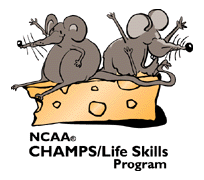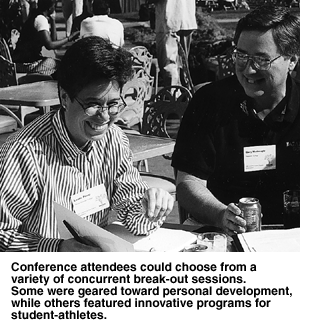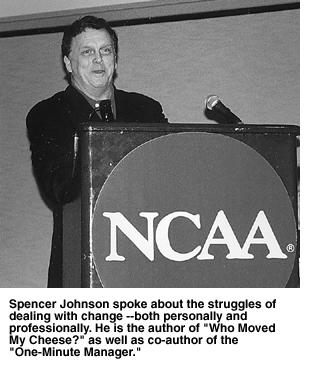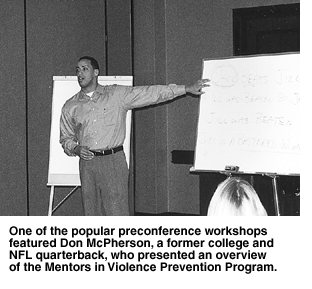The NCAA News - News and Features
The NCAA News -- March 1, 1999
Life Skills coordinators learn new approach for managing change
BY KAY HAWES
STAFF WRITER
 SAN DIEGO -- Cheese took center stage at the CHAMPS/Life Skills Program Continuing Education Conference last month in San Diego. No, it wasn't some kind of a tribute to the state of Wisconsin, nor was it sponsored by the American Diary Council. The cheese that stole the show in San Diego was a metaphor for change -- something that Life Skills coordinators deal with all the time in their daily lives and in the lives of the student-athletes they counsel. SAN DIEGO -- Cheese took center stage at the CHAMPS/Life Skills Program Continuing Education Conference last month in San Diego. No, it wasn't some kind of a tribute to the state of Wisconsin, nor was it sponsored by the American Diary Council. The cheese that stole the show in San Diego was a metaphor for change -- something that Life Skills coordinators deal with all the time in their daily lives and in the lives of the student-athletes they counsel.
The conference took its theme, "Got Cheese? Savoring Change in Life, Work and College Athletics," from the book, "Who Moved My Cheese?" by Spencer Johnson, M.D., co-author of the bestselling book, "The One-Minute Manager."
CHAMPS/ Life Skills coordinators working on the planning committee for the conference brought the book to the NCAA and suggested the theme for the conference.
"Dr. Johnson's book gave us a new vocabulary and model to use for dealing with change," said Lori A. Hendricks, NCAA education outreach program coordinator. "Life Skills coordinators' lives are about change. It is a constant. They're helping student-athletes deal with change on a daily basis, as student-athletes are transitioning from high school through college and into the work force."
Johnson's book features four characters: two mice (Sniff and Scurry) and two little humans (Hem and Haw). Cheese is a metaphor for whatever people seek in life to make them happy -- perhaps a job, wealth or a successful relationship.
In the book, when the old cheese disappears, it's obvious to Sniff and Scurry that they must re-enter the "maze" of life to find it again. It's much more tempting for Hem and Haw to deny that their cheese has moved and protest that "Life's not fair." The book details how one of the humans eventually learns to laugh at himself and seek "new cheese."
 This year's conference included 325 participants from all NCAA divisions, who also learned to laugh at themselves and seek "new cheese" in life. This year's conference included 325 participants from all NCAA divisions, who also learned to laugh at themselves and seek "new cheese" in life.
The day-long preconference workshops were held Saturday, February 13, and participants could choose from diversity education, using role play in life skills education, or violence prevention.
The conference officially opened the next day with Johnson providing the keynote address and encouraging attendees to seek new cheese in their lives.
"Cheese is a symbol of whatever you think is important enough to chase after," he said. "Your job is to show the athletes that their cheese is going to be moving all the time."
The rest of the first day of the conference was devoted to individual development.
"This year we spent an entire day with a focus on the personal and professional development of the Life Skills coordinators," Hendricks said. "It's a stressful job, and we want them to feel appreciated, refreshed and renewed. Then they're in the best position to do the best job for the student-athletes."
Following a general session, "Taking Charge of Your Life, Journaling Strategies for Healthy Thinking," participants could choose from a variety of break-out sessions, including preparing for media interviews, yoga, nutrition, personal financial planning, using your intuition, and using experiential exercises to teach life skills.
The day concluded with an improvisational presentation by those coordinators who had participated in the Life Skills Improv Theater session.
The next day featured a general session, "To Brie or Not to Brie," by Kate Riffee, assistant athletics director for student-athlete support services at Ohio State University. Riffee walked the participants through a study guide for "Who Moved My Cheese?" that could be used with student-athletes.
"We want to provide you with a unique and useful way of looking at and discussing change," she said. "Share the simple cheese story with the people you work with to help them see change differently, and use the cheese language to help people learn to laugh, adapt and succeed during changing times."
 Break-out sessions featured a one-act play, "The Next Level," by Cornerstone Productions, which examined the struggles and triumphs of women athletes during the 20th century. Break-out sessions featured a one-act play, "The Next Level," by Cornerstone Productions, which examined the struggles and triumphs of women athletes during the 20th century.
Other sessions included those on creating and marketing a career-development program, student-athlete financial life skills, building communities through community service, and leadership development.
Another general session, "CommUNITY Leadership -- Being a Big Cheese," featured David Anderson, associate professor at George Mason University and director of the Center for the Advancement of Public Health, who emphasized the role that alcohol plays in campus problems.
Mick Miyamoto, assistant dean of students at the University of Wisconsin, La Crosse, discussed the issue of hazing and its relationship to alcohol and intercollegiate athletics.
Also, Cris Pellegrino, former student-athlete at Tufts University and Cela Oceguera, former student-athlete at the University of California, San Diego, discussed student-athlete codes of conduct and alternatives to alcohol for building community among student-athletes.
Other sessions offered during the conference included campus alcohol strategies, mentoring, challenging social norms, addressing the needs of first-year students and using technology to reach student-athletes.
The closing speaker was Janet M. Justus, NCAA director of education outreach.
"You share a common vision and commitment to affect people's lives, to affect future generations through your work with student-athletes," she told the attendees. "I encourage you to integrate what you have learned here -- not just in your professional life but in your personal life as well."
This was the third NCAA conference devoted solely to CHAMPS/Life Skills coordinators.
"I thought it was very informative," said Derek Horne, assistant athletics director for administration and Life Skills coordinator at the University of Mississippi. "The emphasis on change was good because so many of us are going through that all the time."
 Mary Ellen Cloninger, associate athletics director for internal operations at Utah State University, agreed that the emphasis on change was beneficial. She also appreciated the chance to meet and share ideas with other Life Skills coordinators. Mary Ellen Cloninger, associate athletics director for internal operations at Utah State University, agreed that the emphasis on change was beneficial. She also appreciated the chance to meet and share ideas with other Life Skills coordinators.
"I wear a lot of hats in my job, and I'd have to say that for me personally, these conferences are always the shot in the arm that reminds me why I do what I do," she said.
McPherson: Athletes can lead vs. violence
The violence prevention preconference workshop, which featured Don McPherson, associate director of programs for the National Consortium for Academics in Sports and former quarterback at Syracuse University, was an expansion of an extremely popular break-out session offered at the conference last year.
The workshop featured an introduction to the Mentors in Violence Prevention Program, which is designed to stimulate campus leadership to confront men's violence against women.
"We call it men's violence against women to get men back in the dialogue and make it a men's issue," McPherson said. "This is a men's issue. Historically it's been considered a women's issue, and that lets us do what? Nothing."
McPherson told the Life Skills coordinators that student-athletes could help lead the way in violence prevention on campus.
"There's no other group on your campus that is as identifiable as your student-athletes," he said. "More of your student-athletes are doing positive things than are doing negative things. They are a very significant group of people on your campus, and they represent your institution in a way that no other student or faculty member does. Think about it. What if your quarterback stands up with the person who's the head of your women's center and speaks to a bunch of freshmen and says, 'This will not be tolerated on this campus'?"
McPherson also discussed how culture and language lead to violence, and how the use of "bystander behavior," where men and women use role play to imagine themselves as the bystander in an incident, can help people practice what to do in real life.
McPherson travels to universities all over the country to address the subject of violence prevention with students and student-athletes.
|